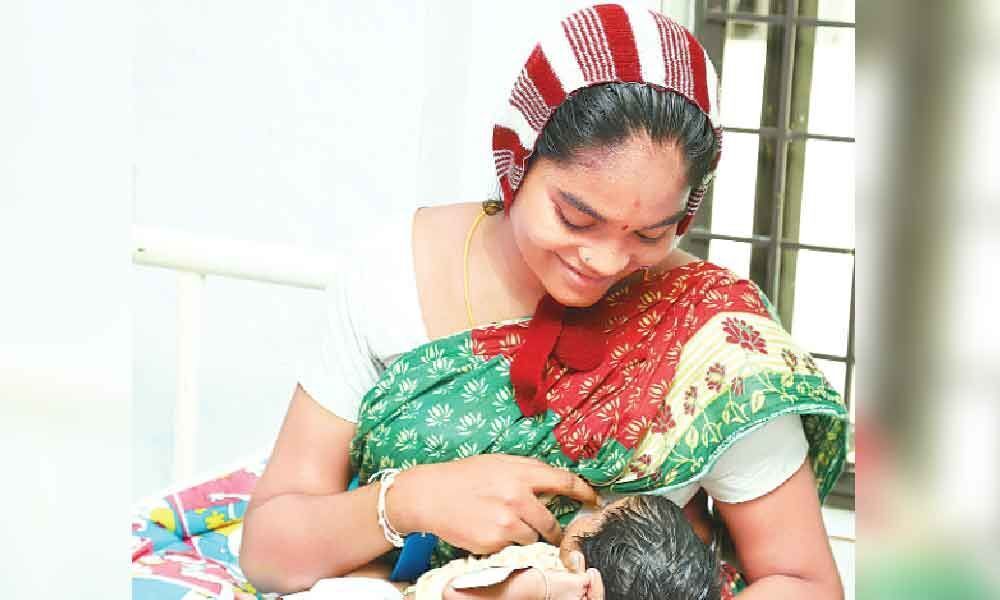Live
- Three persons admitted to hospital for diarrhea treatment
- First Star Outside Milky Way Captured: WOH G64 is 2,000 Times Larger Than the Sun
- Sikkim govt to constitute state Niti Ayog: CM Tamang
- CBI books Rajasthan narcotics inspector for Rs 3 lakh bribe
- Rajasthan bypolls: A tough contest between BJP and Congress
- Albania joins SEPA, paving way for EU integration
- Japanese government approves 250-billion USD economic package to ease price pain
- Six pharma companies to set up their units in Telangana
- The Unstable Events of a 17-Wicket Day in Perth: India vs Australia
- Dutch FM's Israel trip cancelled after Netanyahu's arrest warrant
Just In

- Only 41 per cent of infants are getting mother’s milk within one hour after delivery
- About one lakh children are dying every year because of inadequate breastfeeding
Encouraging breastfeeding to improve the health of babies has attained importance worldwide and the awareness activities have been on a rise from year to year.
The World Health Organisation and UNICEF, and various other organisations have been working on the concept and earmarked the World Breastfeeding Day on August 1 every year and a week, from August 1-7 to take up the campaign more intensely.
The theme for this year's breastfeeding week is "Empower Parents - Enable breastfeeding". WHO recommends exclusive breastfeeding starting within one hour after birth until a baby is six months old and thereafter it should be continued for up to 2 years or beyond simultaneously adding complementary food.
According to an estimate increasing breastfeeding to near universal levels could save more than eight lakh lives every year and the majority being children under six months.
The Associate Professor of Obstetrics and Gynaecology at SV Medical College Dr C Anuradha told The Hans India that there are several advantages of breastfeeding on infants, mother and society as well.
Through breastfeeding there will be emotional and psychological bonding between mother and infants and the risk of diarrhoea, respiratory inspections, allergies and future obesity will be decreased in babies.
Mother's milk contains all nutrients in appropriate quantities and available free thereby reducing financial burden on the family.
It also protects the mothers against breast and ovarian cancers and serves as a natural method of contraception too. It also decreases the risk of mothers developing breast cancer, ovarian cancer, type 2 diabetes, heart disease and such mothers will not gain weight.
Through decreased reliance on formula feeding, the family expenditure in the country can be saved by about Rs.25393 crores.
Government can reduce its healthcare cost by around Rs.720 crores per annum by promoting breastfeeding.
Dr Anuradha said that 55 percent of infants in the country have been receiving exclusive breastfeeding and 41 percent are receiving mother's milk within one hour of the delivery.
So, in spite of several awareness activities, there are a sizeable number of infants deprived of breastfeed. About one lakh children were dying because of inadequate breastfeeding.
For instance, both labourers and working women cannot not breastfeed their babies and becoming helpless.
Government has been formulating policies and programmes from time to time to cover the lapses. The working women having regular employment get six months maternity leave to look after their children and breastfeed them during that period.
However, this facility is not applicable to women working on contract basis resulting in deprivation of mother's milk to their babies.
It needs to be addressed as their workforce has been increasing. Steps should also be taken to wipe off discrimination between feeding mothers and other women at workplace.
She further added that instead of mixed feeding of formula feed and breastmilk only breastfeeding is always better even though the mother is HIV reactive.
Earlier, there was a myth that by breastfeeding, the children there will be sagging of breast, but people have realised the truth. Now, not many think on those lines and the trend should be welcomed.
In fact, women will get stress relief and they will not gain weight as long as they breastfeed the babies. Also, "Inadequate Initiation' of feeding is a myth.
The best stimulus would be the cry of baby itself and it can produce the milk. As long as mother feeds the baby there will be adequate production of milk," Dr Anuradha explained.

© 2024 Hyderabad Media House Limited/The Hans India. All rights reserved. Powered by hocalwire.com







